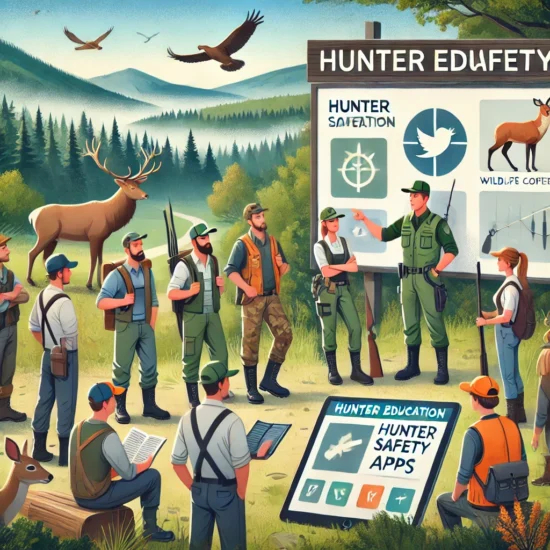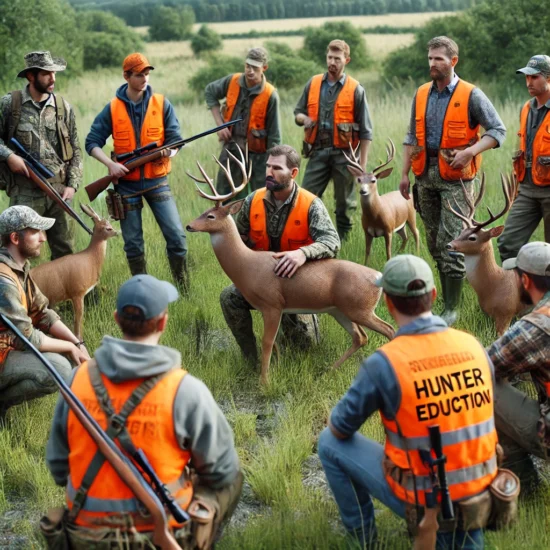Which Group is a Primary Supporter of Hunter Education? – Hunter education is essential in selling accountable and moral searching practices, ensuring safety, and supporting flora and fauna conservation efforts. Over the years, hunter education has become vital in shielding human lives and natural world populations.
However, the success and huge adoption of hunter-education applications did not appear via threat. Behind this movement are several devoted groups and businesses working tirelessly to foster a way of life of duty and safety among hunters.
One of the most full-size members of hunter education is country wildlife businesses. These companies have a vested hobby in ensuring that hunters are knowledgeable because it, without delay, affects flora and fauna management, public safety, and the sustainability of looking practices.
In many states, completing a hunter education route is required for purchasing a search license, demonstrating the level of significance those corporations place on schooling. In addition to national flora and fauna organizations, numerous non-governmental groups (NGOs) have performed a pivotal role in advancing hunter education.
Prominent groups just as the National Rifle Association (NRA) and the Boone and Crockett Club have a long record of promoting moral looking, firearm safety, and flora and fauna conservation. These groups regularly collaborate with national businesses and stakeholders to develop and implement complete instructional applications.
Federal companies, which include the U.S. Fish and Wildlife Service, additionally offer large aid for hunter education through funding and coverage tasks. Under the Pittman-Robertson Act, a federal excise tax on firearms and ammunition facilitates funding country-run hunter education packages, ensuring that crucial assets are available for teaching hunters the abilities they want to be secure and accountable in the field.
Overall, the aid for hunter training comes from a broad coalition of businesses, every contributing to creating a nicely rounded, powerful, and accessible training system for hunters of all ages. Whether through direct coaching, monetary backing, or coverage help, these corporations play an essential role in keeping searching as a sustainable, moral, and safe practice.

The Role of the International Hunter Education Association (IHEA)
The position of the International Hunter Education Association (IHEA) also underscores the collective effort towards advancing hunter training. As a worldwide business enterprise, the IHEA works to promote secure, accountable, and sustainable hunting practices internationally.
This company performs a pivotal position by putting requirements for hunter education packages, growing schooling substances, and providing assets for instructors and college students. Through their work, the IHEA guarantees consistency and satisfaction in hunter education, regardless of the region.
Building on the contributions of national flora and fauna groups and NGOs, the IHEA collaborates with these groups to extend admission to hunter education on a larger scale. By coordinating efforts across global borders, the IHEA ensures that hunters everywhere adhere to excessive ethical and safety requirements, reinforcing that accountable hunting is a usual value.
The IHEA also gives instructor certification programs, making sure that folks who educate hunter education are properly ready with the know-how and tools to correctly educate new hunters. Their involvement in curriculum development guarantees that programs remain updated with modern-day searching laws, policies, and environmental concerns, growing a cohesive studying enjoy for Hunters International.
The IHEA’s efforts align with federal groups, national corporations, and NGOs, contributing to a unified undertaking of fostering accountable hunting practices. Through their international influence, the IHEA is critical in maintaining the integrity of hunter education programs and ensuring the long-term sustainability of looking as a loved-door hobby.
The Backbone of Hunter Education
The backbone of hunter training rests firmly on the assistance of state flora and fauna businesses, which are the number one drivers behind most hunter training packages. These businesses are tasked with coping with natural world populations, imposing hunting rules, and ensuring public safety.
To accomplish these dreams, state wildlife agencies paintings diligently to expand comprehensive hunter-education guides that cover firearm safety, wildlife conservation, searching ethics, and state-specific legal guidelines.
State agencies also ensure that those education programs are reachable to each person, imparting each online and online training to deal with specific learning patterns and schedules. In many states, those publications are obligatory for first-time hunters, reflecting the significance positioned on education earlier than venturing into the sphere.
National flora and fauna agencies have installed a robust foundation for accountable-looking practices nationwide by making hunter education a requirement for acquiring a hunting license.
In addition to their role in education, country natural world businesses accomplice with federal businesses, non-governmental entities, and personal conservation businesses to decorate the satisfaction and attain of hunter education.
These collaborations bring a wealth of assets, information, and economic help that ensure hunter education remains modern with evolving rules and environmental challenges.
Ultimately, state natural world organizations are the cornerstone of hunter education, presenting the infrastructure and oversight needed to prepare new hunters for the obligations they face. Their ongoing determination enables a safe, ethical, and knowledgeable community of hunters who recognize the importance of their position in natural world conservation and public safety.

The Role of Technology in Hunter Education
Generation’s role in hunter education has become increasingly outstanding as virtual equipment and structure advancements have made educational packages more reachable and engaging. Building on the foundational efforts of state flora and fauna groups, non-governmental agencies, and the IHEA era gives a way to extend the reach of hunter education and adapt to the needs of cutting-edge newbies.
Online hunt Online guides, for instance, have revolutionized how people can get admission to education. Frequently state-accepted, these courses permit students to examine at their tempo, overlaying critical topics, including firearm safety, ethics, and conservation principles.
With online learning, folks who may not have been capable of attending in-person lessons due to time constraints or geographic limitations can still receive the education they want. Mobile apps have also played a big role in enhancing hunter education.
Apps like OnX Hunt and HuntWise offer hunters up-to-date mapping, climate conditions, and national-precise regulations, assisting them to live knowledgeable and prepared within the area. These apps toughen the training taught in hunter education packages, ensuring hunters have get right of entry to to vital facts even after finishing their guides.
Additionally, virtual truth (VR) is beginning to emerge as a device for teaching looking abilities in a safe, controlled environment. Through immersive simulations, new hunters can exercise firearm managing and selection-making earlier than heading out into the sector.
Overall, the era has made hunter training extra on-hand, interactive, and powerful, complementing traditional techniques and improving the general studying experience for aspiring hunters.
Local Hunting Clubs and Civic Organizations
Local searching golf equipment and civic businesses play an important role in fulfilling hunter education, adding a grassroots size to the broader efforts spearheaded through country groups, NGOs, and technological advancements.
These neighborhood entities offer a feel of community and mentorship that complements formal hunter training courses. For many new hunters, these clubs bridge lecture room instruction and realistic, in-discipline enjoyment.
Hunting clubs frequently organize workshops, seminars, and group hunts where beginner hunters can practice the skills they’ve discovered underneath the steerage of experienced participants. This peer-to-peer mentoring now not only effectively reinforces secure and moral-looking practices but also fosters a way of life of conservation and responsibility.
Many of these golf equipment are associated with country natural world groups to provide certified hunter education courses, bringing professional preparation to the neighborhood degree without delay without delay.
Civic corporations, including the Rotary Club or Lions Club, additionally guide hunter education through sponsoring nearby events, supplying investment for scholarships, or helping to organize community outreach programs.
These groups recognize the importance of hunter training to promote public safety and wildlife conservation, particularly in rural regions wherein searching is a key aspect of the local way of life. The involvement of local search clubs and civic agencies guarantees that hunter education is not only a formal requirement but a shared network attempt.
These corporations create an environment wherein new hunters feel supported and encouraged to maintain gaining knowledge of and improving their skills, ultimately contributing to the sustainability and moral exercise of hunting for generations to come.
Conclusion
In conclusion, hunter education is fulfilled based on a large coalition of supporters, each contributing to the shared aim of selling safe, moral, and accountable-looking practices. State natural world groups serve as the backbone, offering the structure and assets to make hunter-education packages handy to all.
Their collaboration with federal organizations, non-governmental companies like the NRA and the Boone and Crockett Club, and worldwide entities like the International Hunter Education Association (IHEA) guarantees that hunter education is properly funded, complete, and current.
Technological improvements, including online publications and mobile apps, have further stronger hunter training by making it extra accessible to a wider target market. Additionally, nearby search clubs and civic companies offer vital community-based aid, developing a bridge between lecture room learning and real-world enjoyment.
This peer-pushed mentorship fosters a tradition of continuous learning and moral conduct inside the field. Together, these agencies ensure that hunter education remains a cornerstone of natural world conservation and public safety.
As the panorama of hunting evolves, the collective attempt of those agencies will preserve the destiny of hunting, making sure it remains sustainable, moral, and available for generations to come.
Frequently Asked Questions
What is hunter education?
Hunter education trains hunters about accountable searching practices, firearm protection, flora and fauna conservation, and applicable legal guidelines and rules. The goal is to ensure hunters are prepared and informed, contributing to public safety and flora and fauna conservation.
Why is hunter education important?
Hunter training is vital for several motives: it promotes secure firearm coping, encourages moral hunting practices, supports wildlife management efforts, and allows reduced hunting injuries. By instructing hunters, these packages contribute to the sustainability of hunting and the conservation of natural assets.
Who are the primary supporters of hunter education?
The primary supporters of hunter education encompass state natural world agencies, federal corporations like the U.S. Fish and Wildlife Service, non-governmental businesses (NGOs) such as the National Rifle Association (NRA) and the Boone and Crockett Club, and international agencies like the International Hunter Education Association (IHEA).
How do state wildlife agencies contribute to hunter education?
State flora and fauna organizations are important to hunter training. They manage flora and fauna populations and put in force-looking rules. These agencies broaden and offer complete hunter education publications which can be frequently required to obtain a searching license. They ensure the programs are reachable and up-to-date, protecting vital subjects, including safety, felony factors, and ethical searching.
What role does the International Hunter Education Association (IHEA) play in hunter education?
The IHEA unit’s worldwide standards for hunter training programs develop educational substances and present resources for instructors and college students. It works globally to sell secure and responsible searching by ensuring consistency and quality in hunter education throughout unique areas.
How have technological advancements impacted hunter education?
Technology has extensively more desirable hunter education, making getting to know resources more handy. Online apps and digital fact (VR) simulations were added to provide flexible, engaging, and powerful education studies. These tools allow novices to look at their personal pace and practice skills in simulated environments earlier than using them in the area.
Can you take hunter education courses online?
Yes online on wildlife corporations offer online hunt online courses. These are designed to be comprehensive and convenient, allowing people to complete their training remotely at their own pace. Online guide Online cowl all the important subjects required for a hunting license.
What is the role of local hunting clubs in hunter education?
Local searching clubs play a vital role by supplying hands-on, sensible enjoyment and mentorship to new hunters. These clubs frequently arrange workshops, seminars, and institution hunts wherein novices can apply what they have discovered and benefit from insights from experienced hunters. This network aid enhances the mastering manner and reinforces ethical hunting practices.
Are hunter education courses mandatory?
Completing a hunter education route is obligatory in many states to reap a first-time-looking license. The requirements can vary via state, so it is important to test with neighborhood wildlife corporations for particular policies.
How do civic organizations contribute to hunter education?
Civic corporations aid hunter training through investment scholarships, organizing network outreach packages, and sponsoring occasions. Their involvement promotes hunter education as a critical thing of community safety and natural world conservation, specifically in regions wherein looking is a sizable part of the lifestyle.
Here is An Interesting Article: What Is Early Intervention for Autism?


